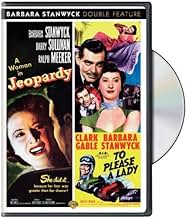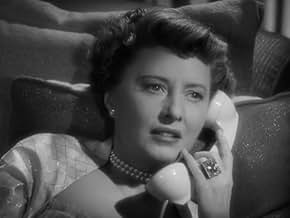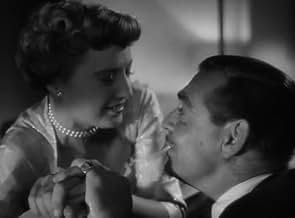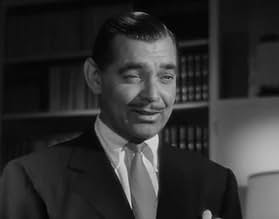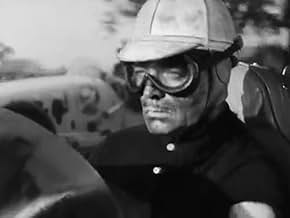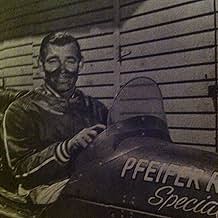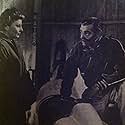Ajouter une intrigue dans votre langueA former war hero and midget car racer meets his match in a feisty reporter who blames his reckless tactics for an accidental racing death.A former war hero and midget car racer meets his match in a feisty reporter who blames his reckless tactics for an accidental racing death.A former war hero and midget car racer meets his match in a feisty reporter who blames his reckless tactics for an accidental racing death.
- Mike's Pit Crew
- (as Lew Smith)
- Ted Husing
- (voice)
- Newspaper Editor
- (uncredited)
- Driver
- (uncredited)
- Pit Crew Member
- (uncredited)
- Racing Spectator
- (uncredited)
- Greengrove Race Spectator
- (uncredited)
Avis en vedette
Once one gets past the lousy and rather misleading title, 'To Please a Lady' is not one of those misfires and is above average in execution. It may be wanting in the story and script departments and both Gable and Stanwyck did better films before and since, especially before (no iconic stuff here). But neither bring the side down and neither does Brown in the director's chair. Even non-car racing fans should find some worth in 'To Please a Lady' as will those that are fans.
'To Please a Lady' does have a good deal done well. Gable's tough charisma and Stanwyck's steel really shine through, as do their wit and crackling chemistry. Have always gotten a lot of enjoyment out of Adolphe Menjou, he was often seen in one particularly recognisable role but he played that so well that it doesn't matter and this is no exception. All the cast do well. The racing does thrill and excite and one does get very nostalgic over seeing and recognising all the different cars. Brown's direction is lively and distinguished enough.
Although the production values are not perfect, the photography is nicely framed and slick throughout. Bronislau Kaper was a gifted composer with a number of fine scores, his one for 'To Please a Lady' is not one of his best but it fits and doesn't overbear at least. The script has some wit and the film isn't dull at least.
Having said that the story is very thin and often rather contrived, while the racing thrills some of the non-racing aspects of the story could have done with more juice. Some wit aside, the script flows rather awkwardly, can be rather trite and some lines did make me cringe.
Would have liked more development to the romance, which was convincing in chemistry but development-wise it felt unrealistically rushed. Character motivations also could have been elaborated upon more and while the photography is fine the back projection and splicing can be obvious at times.
Concluding, above average but not great. 6/10
It took Gable's career a while to get back on track - excuse the pun - after World War II. He was older than the other matinée idols, he was a grieving widower when he returned from the war, and the indelible image he had created as Rhett Butler would haunt him. It wasn't until the mid-fifties that he really found his groove with some very good films.
This is one of the ordinary type films Gable made during this period, and here he's joined by Barbara Stanwyck as a sharp columnist. She is critical of midget car racer Gable when, during a race, another driver is killed, and he was part of the collision. She basically destroys his career in midget car racing. After some stunt driving, he earns enough to buy a car to enter the big car races. Feeling at first guilty about hurting his career, Stanwyck seeks him out while he's stunt driving; they fall for one another, but she can't get past his ruthlessness in competition.
Both stars are very good. Stanwyck did these cold businesswomen well. She's moving here into older women roles, her wonderful figure intact.
There is a lot of speedway racing in this film.
This movie is pleasant enough, but it would have been nice if stars of this stature could have been given a really top-notch script and production values.
Le saviez-vous
- AnecdotesBeing in Indianapolis was difficult for Clark Gable personally. The city had been the last stop on a war bond tour in 1942 for his second wife, actress Carole Lombard, before she was to fly back home to Los Angeles. Tragically, Lombard's plane never made it back. It crashed in Nevada killing everyone on board. Theirs had been a happy marriage, and it was a loss from which Gable never recovered. At the time of To Please a Lady (1950) Gable had finally remarried, this time to Douglas Fairbanks' widow, Sylvia Ashley. During filming he seemed happier and healthier than he had in years according to friends. Even so, Gable remembered his beloved late wife while in Indianapolis. He quietly made a point to visit the downtown locations where Lombard had made her final public appearances before meeting her untimely death.
- GaffesBecause footage shot during the actual 1950 Indy 500 was used, Mauri Rose can be seen exiting the pits driving past the pit for the real car #17, Joie Chitwood (Mauri Rose and Joie Chitwood's pits were next to each other during the 1950 500 race).
- Citations
Mike Brannan: You figure on doing another column on me?
Regina Forbes: You're only worth a couple of lines now.
Mike Brannan: Well, don't write 'em! I've been risking my neck with this outfit.
Regina Forbes: I hope they pay you well.
Mike Brannan: A hundred bucks a show, and I've been saving every dime. I'm gonna drive with the big cars now, and what you wrote about me doesn't go with them. So I'm warning you. Lay off me in the future.
Regina Forbes: [Amused] You're warning me?
Mike Brannan: You better listen to what I'm saying, or I'll knock that smile off your face!
Regina Forbes: [She laughs at him] Knock it off.
[He slaps her]
Regina Forbes: That's just about what I expect from you.
Mike Brannan: The guys you run around with wouldn't do that, would they? Well, it's time somebody roughed you up a little! I can handle you, baby. You're just another dame to me!
[He grabs her suddenly, kisses her, and leaves for his car. She looks after him with a subtle smile indicating she enjoyed it]
- ConnexionsEdited into Hollywood: The Dream Factory (1972)
- Bandes originalesPolly-Wolly Doodle
(uncredited)
Credited usually to Daniel Decatur Emmett (as Dan Emmett)
Whistled by several characters
Meilleurs choix
- How long is To Please a Lady?Propulsé par Alexa
Détails
- Date de sortie
- Pays d’origine
- Langue
- Aussi connu sous le nom de
- Miedo de amar
- Lieux de tournage
- Indianapolis Motor Speedway - 4790 W. 16th Street, Speedway, Indiana, États-Unis(1950 Indianapolis 500 race)
- société de production
- Consultez plus de crédits d'entreprise sur IMDbPro
Box-office
- Budget
- 1 853 000 $ US (estimation)
- Durée1 heure 31 minutes
- Couleur
- Rapport de forme
- 1.37 : 1
Contribuer à cette page



